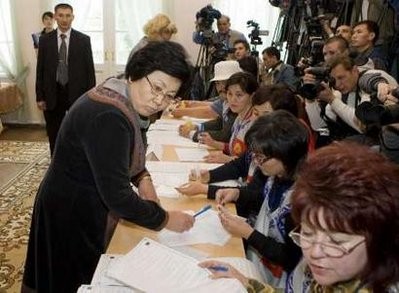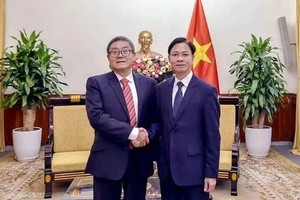Kyrgyzstan on Sunday voted in elections for the first parliament with real power in ex-Soviet Central Asia, hoping the polls will bring stability after a year of violence that left hundreds dead.

President Roza Otunbayeva, who came to power in a bloody uprising in April and has championed the new political system, rejected warnings from Russia that the elections risked sparking a resurgence of the violence.
"Today I am calm and I think that the elections will proceed normally, without excesses, because a lot of resources have been invested in them," she told reporters as she cast her vote.
"Today is a historic day for the Republic of Kyrgyzstan. The people will choose their fate, their future," said added. Some 2.8 million of the country's five million population are eligible to vote.
Kyrgyzstan created Central Asia's first parliamentary democracy in a referendum earlier this year after the bloody April revolution, which toppled former president Kurmanbek Bakiyev, and deadly inter-ethnic clashes in June.
The system, which will allow the Zhogorku Kenesh parliament to appoint the government, is a stark contrast to the strongman presidential rule elsewhere in the region where parliaments operate as no more than a rubber stamp.
But around six parties are expected to pass the five percent threshold to win seats in the assembly, meaning that the outcome is set to be anything but simple with intense post-election bartering likely.
A pair of pro-Otunbayeva centre-left parties -- Ata-Meken and the Social Democratic Party of Kyrgyzstan (SDPK) -- are expected to figure prominently but not win a majority, according to recent opinion polls.
But an upset could come from the Ar-Namys party led by ex-prime minister Felix Kulov, a favourite of the Kremlin who has campaigned under law-and-order slogans and vowed to reinstate the presidential system favoured by Moscow.
Kulov, who on Friday led a spectacular rally on horseback, exuded confidence as he cast his vote in Bishkek. "I am sure that Ar-Namys will win the parliamentary elections, there is no doubt of this," he said.
The virulently nationalist Ata-Zhurt, targeted this week in a mob raid on its offices that saw piles of its campaign literature burned in the street, has also made a strong campaign showing.
But Otunbayeva played down fears that the elections will create a chaotic patchwork of parties in the Zhogorku Kenesh, saying she believed it could form a government "if not at the first then at the second attempt".
Early turnout appeared brisk with men in the traditional Kyrgyz kalpak felt hat casting their ballots and the central election commission reporting that 25.33 percent of the electorate had voted by lunchtime.
However not all Kyrgyz have been won over by Otunbayeva's plans.
"I do not get involved in politics," said Asan, 42, who owns a Bishkek meat store. "It's a dirty business and I have no confidence in today's politicians."
Russian President Dmitry Medvedev has warned the elections could lead to a "catastrophe" in Kyrgyzstan but despite the dire predictions there were no reports of unrest after polls opened at 0200 GMT.
Clashes between ethnic-majority Kyrgyz and minority Uzbeks left between 400 and 2,000 people dead in the south of the country in June, with Uzbeks claiming they were the victims of targeted bloodletting by the security forces.
In the main southern city of Osh there was an uneasy calm as voters queued outside polling stations which in some cases little more than a room amid the rubble of burned out homes.
"If the main parties... start playing games there could be another conflict, not between Uzbeks and Kyrgyz but a civil conflict," Naman Maminov, 51, an ethnic Uzbek said he voted.
Strategically situated Kyrgyzstan -- the only country in the world to host both Russian and US military bases -- has long been considered the region's most politically volatile state.
Bakiyev, who has taken refuge in Belarus since his ousting, came to power on the back of the so-called Tulip Revolution uprising of 2005 that toppled post-Soviet leader Askar Akayev.






)

















